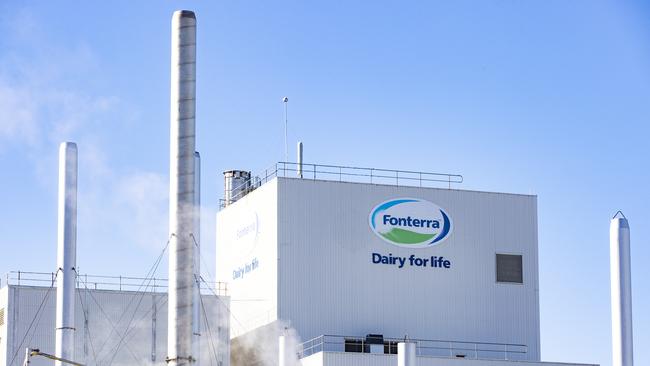
The deal was formally flagged in May and, somewhat surprisingly, no advisory team was in place for the Australian and accompanying asset sales with a preference for a single buyer or possible float.
Local boss Rene Dedoncker took over when his predecessor, the then Auckland-based Judith Swales, quit after losing the fight to keep the consumer division, as the Kiwi co-op focuses on its business-to-business commodities based operation, which includes its non-Australian food service division.
Consumer accounts for around 37 per cent of profits and 29 per cent of revenues.
The move comes as local dairy farmers, who while riding high in recent years have this year copped a cut in farm gate prices just as international prices edge higher.
The almost co-ordinated cut from the big three, Saputo, Bega and Fonterra, came ironically as Coles farmers emerged in the strongest position, given they had longer-term contracts with the only integrated processor/retailer.
Processors are finding their feet again as evidenced by higher prices on the supermarket shelves.

Farmers are facing mixed weather patterns; Tasmania is in drought, NSW has too much rain and South Gippsland has continuing perfect conditions.
The fact Australian farmers enjoyed a farmgate premium over their Kiwi cousins did allow Fonterra to ramp up prices for cheese and other products in Australia.
This is continuing as global process edge higher.
From 2011 to 2019 the dollar-a-litre of milk was the talk of the town; now it sells for $1.60 a litre.
Dedoncker will shortly boost his team. Former TWE executive David Breckenridge takes over as chief financial officer replacing Mark Conway who last year joined Sigma.
Processors have worn most of the pain in recent years, gradually shedding plants to offset a smaller local output which now stands at around 8.2 billion litres on Rabobank figures – down from 12 billion when deregulation started in 2000.
Demographics are mainly to blame. Farmers are exiting or winding down before retirement with few prepared to invest to boost output and spend the up to $5m needed to install a state-of-the-art large scale milking operation.
This has left the market in relative balance with little spare milk.
One of the complications of the Fonterra sale is that two probable buyers – Bega and Saputo – face ACCC issues. The latter has scaled back processing with the recent plant sale to Coles. The Asian network also provides upside with strong operations in Indonesia, Malaysia and Sri Lanka but these may not suit local buyers.
Transforming rubber from the road
Electric vehicles tend to be heavier and reach top speeds quicker than their internal combustion engine (ICE) competitors, which means they also get through their tyres 20 per cent faster than ICE cars.
Their sales growth compounds the reality that Australia junks 26 million of the 90 million tyres in use each year.
This creates 350 tonnes of waste which is now banned from export.
A start-up, Green Distillation Technologies based in Warren northwest of Dubbo, has an answer by using a destructive distillation method invented by the late Denis Randall.
GDT has been around since 2012 as an unlisted public company amid periodic talk about big expansions. But talk doesn’t convert unless backed with money, which the company now has thanks to a $25m investment from an undisclosed family company.
The method involves thermal decomposition of tyres in a vacuum-sealed chamber at between 300C to 500C, transforming them into oil, carbon and steel.
A 10kg car tyre produces 4 litres of oil, 4kg of carbon and 2kg of steel.
The carbon blocks can be used as a coal substitute in steel mills or in making graphene for electronics, energy storage, sensors and biomedical devices, among other uses.
With funds now in the bank the company is building up its operation in Warren by a third to 8320 tonnes of tyres a year by the year’s end – and then a maximum capacity of 19,300 tonnes (650,000 tyres) by May next year.
The next step is to build a similar sized plant in Toowoomba. Completion is aimed for 2026, during which time a third plant would start in Victoria.
GDT is chaired by former Brambles and Coles boss John Fletcher and the hope is that with the Warren plant showcasing the zero-emissions process, local environmental agencies will back the plants and, with the first big investment in the wallet, more will come ahead of a potential public listing.
ACCC’s clout on display
This week’s ACCC deal with Optus and Telstra undertaking to not guarantee Google a default position on their Android phones, clears them from any involvement in the long-expected ACCC action against Google in search in general.
This narrows the fight for Google which will be huge when it inevitably happens.
The same Google, it should be noted, pays Apple about $US20bn a year to ensure its search engine tops the Apple pages.
Another Peter Dutton thought bubble hit reality turbulence this week, starting with the questions what assets would naughty Coles and Woolworths have to sell to whom and just what this would mean for national supermarket prices.
Divestitures may work in, say, telecoms where arguably the NBN was the equivalent of forcing Telstra out of fixed-line telecommunications and maybe theoretically force it to sell mobiles if it really plays up.
Selling a bunch of retail stores to Nationals leader David Littleproud’s mate, Fred Harrison, at IGA Ritchies may make him money but won’t deliver lower national consumer prices.
The fintechs are right: consumer data rights didn’t deliver competition in banking because the big banks didn’t want it to.
Productivity Commissioner Stephen King argues that phone number portability offers a blueprint.
Instead of consumers requesting number portability from, for instance, Telstra, the acquiring company, such as Optus, should make the demands in what more likely would be hundreds of numbers.
Back that with ACCC controls over the time Telstra had to release the numbers – and penalties for failing to comply – and magically number portability turned from too difficult to no problem at all on a more even playing field.
The Chemist Warehouse team is pragmatic and, while dismissing the ACCC concerns over its Sigma merger, it has lodged a potential solution which has delayed the proposed September 5 decision date.
The ACCC noted the “new information” and suspension of the inquiry timeline this week without going into details.
One concern is the tight franchise agreement between CW and its often family-based franchisees which is seen as a potential hurdle to new retail competition – particularly if applied to the about 4000 allied Sigma banner groups.
As reported over the past two weeks, the ACCC has now released a statement of issues based on concerns around combined operations in the Illawarra district of NSW in the proposed $1bn sale of Lendlease housing estates to Stockland.




Fonterra chair Peter McBride has finally pushed the button on the $2bn sale of his Australian consumer and local food service assets, with a beauty parade held this week for advisers on what appears to be a long and potentially complicated process.